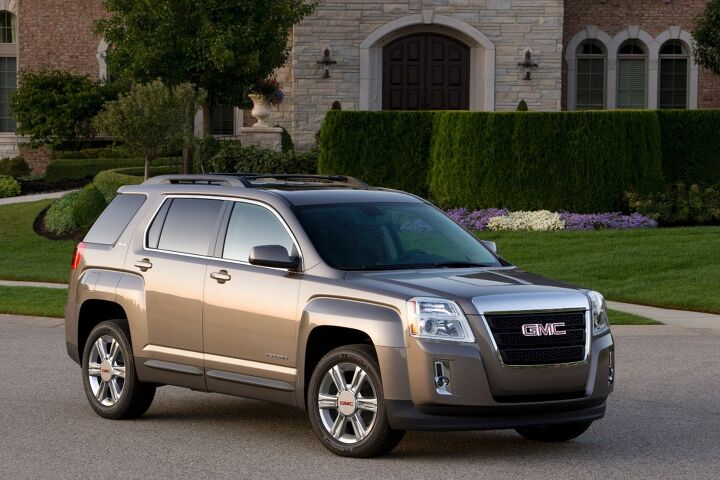With No New Product Promised, GM Canada Workers Could Walk Off the Job at Midnight

GM Canada and the union representing Detroit Three autoworkers north of the border have entered their final day of contract talks ahead of a midnight strike deadline.
Unless both sides achieve a breakthrough today, there’s little reason to believe a walkout at the company’s Oshawa, Woodstock and St. Catharines, Ontario facilities won’t occur as the clock strikes twelve.
A deal with Unifor hinges on new product commitment from GM Canada, especially for its Oshawa assembly plant. Product is drying up at the century-old plant, which could be shuttered within a couple of years if GM doesn’t allocate new vehicles to its two production lines.
As of yesterday, the product pipeline was still dry, even as Unifor president Jerry Dias put on a cautiously hopeful face.
“I’m feeling much better today than I did yesterday but I’m still not feeling great,” Dias told the Globe and Mail. “We are having some constructive conversations, finally.”
Last week, both sides were said to be far apart in negotiations, with little to no movement on the key bargaining issue. Despite Dias’ claims, a “high-ranking” union source told the newspaper that GM has not offered any new product for the Oshawa plant, which employs about 2,500 hourly workers.
Hampering the talks is the simple reality that GM has no product to send to Oshawa. The automaker’s roster of existing and planned vehicles are all allocated to other plants, while the Oshawa-built Chevrolet Impala, Buick Regal and Cadillac XTS (as well as overflow Chevrolet Equinox production) can easily be sent elsewhere.
GM is Unifor’s target company in this round of contract talks. Any agreement with that automaker will guide contract talks with the remaining two. In the event of a strike, GM Canada’s CAMI assembly plant, covered by a separate collective agreement, has vowed to not use replacement parts sent from U.S. plants. That could halt the production of Equinox and GMC Terrain crossovers.
[Image: General Motors]

More by Steph Willems
Latest Car Reviews
Read moreLatest Product Reviews
Read moreRecent Comments
- ToolGuy 9 miles a day for 20 years. You didn't drive it, why should I? 😉
- Brian Uchida Laguna Seca, corkscrew, (drying track off in rental car prior to Superbike test session), at speed - turn 9 big Willow Springs racing a motorcycle,- at greater speed (but riding shotgun) - The Carrousel at Sears Point in a 1981 PA9 Osella 2 litre FIA racer with Eddie Lawson at the wheel! (apologies for not being brief!)
- Mister It wasn't helped any by the horrible fuel economy for what it was... something like 22mpg city, iirc.
- Lorenzo I shop for all-season tires that have good wet and dry pavement grip and use them year-round. Nothing works on black ice, and I stopped driving in snow long ago - I'll wait until the streets and highways are plowed, when all-seasons are good enough. After all, I don't live in Canada or deep in the snow zone.
- FormerFF I’m in Atlanta. The summers go on in April and come off in October. I have a Cayman that stays on summer tires year round and gets driven on winter days when the temperature gets above 45 F and it’s dry, which is usually at least once a week.

































Comments
Join the conversation
So unless the company allocates more production there instead of somewhere that makes (more?) money, they are going to stop working? I'm understanding why GM needed to be bailed out.
A decade ago the Canadian and Ontario Governments paid billions to take 11.7% ownership in GM to help save them from a forced rummage sale. In a sane world that taxpayer investment would have come with long-term requirements for GM to keep a certain percentage of its global production in Canada. In a saner world GM would have been sold piecemeal and the Canadian factories would have different owners. Most likely, those owners wouldn't have the financial and political clout to survive a strike by Unifor. Instead we have the current situation, where GM is flush with cash and holds all the cards. Like it or not, the power of the auto workers has always been the threat of a strike...Mutual Assured Destruction, if you will. Now, the survival of GM is secured not by compromise with the workers but by the US and Canadian Govts. Without the power to bring GM to its knees, Unifor is reduced to begging its Govt to give GM more handouts so GM will continue to employ them. In short, the belief that GM is 'too big to fail' has sacrificed the interests of auto workers in favor of the interest of GM. Funny how those heartfelt plans to save the working class always entail giving large corporations loads of money, and always have the "unintended" consequence of screwing the middle class.